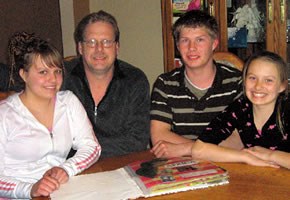BY KEITH LACEY
Watching their three children walk out the front door of their Wanup home early next week knowing they’re travelling halfway around the world to Rwanda, is going to be among the most difficult things Jan and Lisa Romo have done as parents.
However, they know their children, Melissa, 17, Andrew, 16, and Vanessa, 12, have their hearts in the right place in volunteering to help build a children’s orphanage in Kingali the capital city in the war-torn African nation.
“We’re obviously quite nervous about watching all three leave us at the same time, but we obviously feel this is going to be the experience of a lifetime for all three of them,” said Jan, looking proudly at his children.
“My wife and I both think this trip is going to teach them to really appreciate what we have here in Canada, to take a serious look at society as a whole. Hopefully (they will) commit themselves to trying to make the world a better place to live as they get older.”
This Monday Melissa, Andrew and Vanessa will head to Toronto, where they will board a plane for England. After a brief stopover, they will fly to Nairobi, Kenya. They will spend a week visiting an African Lion Safari, before heading to Kingali. Once there, they will spend two weeks working with two dozen or so other youngsters to help build a home for 60 orphans and 10 widows.
Melissa and Andrew are students at Lo-Ellen Park Secondary School, and Vanessa attends R.L. Beattie Public School.
The idea for the Romo children to participate in this inspirational mission came from their grandmother, Hazel Hill, who is a pastor with the Victory Church in Los Angeles, California.
“Grandma has been doing mission work all over the world most of her life,” said Melissa. “She’s the one who suggested this and has spent several months organizing everything for us. She’s been planning this for us for over a year.”
The Romo children will be part of contingent of two dozen or so teenagers from the Toronto area and the United States working on the orphanage, which will be called the Victory Family Home of Champions.
“This is going to be the experience of a lifetime and we can’t wait to go,” said Melissa smiling. “Not too many kids our age ever get to experience something like this.”
“We will be making a difference in the lives of all these young orphans..I’m sure it’s going to be something I’ll never forget,” Andrew said.
Melissa said she remembered asking her grandmother to take her to Africa several years ago and her grandma promised she’d make that dream come true. Her grandmother won’t be part of this journey, but being able to be part of an adventure with her siblings will be just as rewarding.
The Victory Church has followers all around the world. Much of the money it raises goes toward work in some of the world’s poorest regions, said Jan Romo.
The Romo family know all about the horrific genocide in Rwanda in 1994. As part of their presentations to various school and community groups to raise funds and gather clothing and other items they will give to the orphans, the Romo children talked about the country’s challenges.
So far the young people have collected hundreds of toothbrushes, dozens of flip flop sandals and a large amount of school supplies. They spent last weekend collecting money and donations of clothing and personal items at a local shopping mall.
“I’m hoping this trip will change their lives,” said Lisa Romo. “Helping other people in other countries is a wonderful thing, but it’s my hope they will come home and realize there are people right here who are less fortunate and need help and they will want to continue to do good work right at home.”
Her mother has travelled to Africa many times. She’s confident her children will be able to handle this trip and remain in good health.
The Romos will be missing three weeks of school, but their teachers have been very co-operative to allow them to leave. All three will have to keep a scrapbook and make a presentation to their respective classes when they return from Africa the second week in May.
Brief history of Rwanda
In 1959, three years before independence from Belgium, the majority ethnic group, the Hutus, overthrew the ruling Tutsi king. Over the next several years, thousands of Tutsis were killed, and some 150,000 driven into exile in neighboring countries. The children of these exiles later formed a rebel group, the Rwandan Patriotic Front (RPF), and began a civil war in 1990. The war, along with several political and economic upheavals, exacerbated ethnic tensions, culminating in April 1994 in the genocide of roughly 800,000 Tutsis and moderate Hutus. The Tutsi rebels defeated the Hutu regime and ended the killing in July 1994, but approximately two million Hutu refugees, many fearing Tutsi retribution, fled to neighboring Burundi, Tanzania, Uganda, and the former Zaire. Since then, most of the refugees have returned to Rwanda, but several thousand remained in the neighbouring Democratic Republic of the Congo (the former Zaire) and formed an extremist insurgency bent on retaking Rwanda, much as the RPF tried in 1990. Despite substantial international assistance and political reforms, including Rwanda’s first local elections in March 1999 and its first post-genocide presidential and legislative elections in August and September 2003, the country continues to struggle to boost investment and agricultural output, and ethnic reconciliation is complicated by the real and perceived Tutsi political dominance. Kigali’s increasing centralization and intolerance of dissent, the nagging Hutu extremist insurgency across the border, and Rwandan involvement in two wars in recent years in the neighboring Democratic Republic of the Congo continue to hinder Rwanda’s efforts to escape its bloody legacy.
Source: www.cia.go
